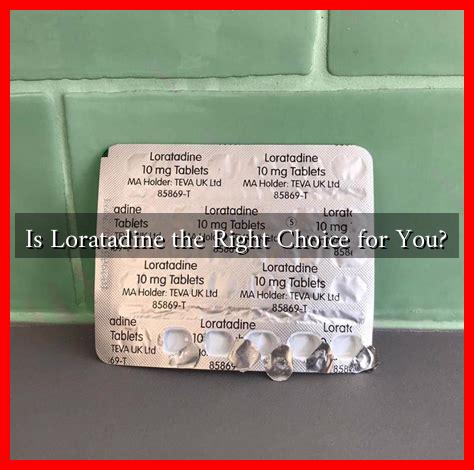-
Table of Contents
Is Loratadine the Right Choice for You?
Allergies can be a significant nuisance, affecting millions of people worldwide. With a plethora of antihistamines available, choosing the right one can be daunting. Loratadine, a popular second-generation antihistamine, is often recommended for allergy relief. But is it the right choice for you? This article delves into the benefits, potential side effects, and considerations surrounding Loratadine to help you make an informed decision.
Understanding Loratadine
Loratadine is an antihistamine that is primarily used to relieve allergy symptoms such as sneezing, runny nose, and itchy eyes. It works by blocking the action of histamine, a substance in the body that causes allergic symptoms. Loratadine is available over-the-counter and is marketed under various brand names, including Claritin and Alavert.
Benefits of Loratadine
One of the main advantages of Loratadine is its effectiveness in treating allergy symptoms. Here are some key benefits:
- Non-Drowsy Formula: Unlike first-generation antihistamines, Loratadine is less likely to cause drowsiness, making it suitable for daytime use.
- Long-Lasting Relief: Loratadine provides relief for up to 24 hours, allowing for once-daily dosing.
- Wide Availability: It is readily available in various forms, including tablets, liquid, and dissolvable strips.
- Safe for Most Adults and Children: Loratadine is generally considered safe for use in children over two years old and adults.
Potential Side Effects
While Loratadine is generally well-tolerated, it is essential to be aware of potential side effects. Some individuals may experience:
- Headaches
- Fatigue
- Dry mouth
- Gastrointestinal disturbances
In rare cases, severe allergic reactions may occur. If you experience symptoms such as difficulty breathing, swelling of the face or throat, or a rash, seek medical attention immediately.
Who Should Consider Loratadine?
Loratadine may be an excellent choice for individuals who:
- Experience seasonal allergies or allergic rhinitis.
- Need a non-drowsy option for daytime relief.
- Are looking for a long-lasting solution to allergy symptoms.
However, it may not be suitable for everyone. Individuals with certain medical conditions or those taking specific medications should consult a healthcare provider before starting Loratadine. For example, people with liver or kidney issues may require dosage adjustments.
Case Studies and Statistics
Research supports the efficacy of Loratadine in managing allergy symptoms. A study published in the Journal of Allergy and Clinical Immunology found that Loratadine significantly reduced symptoms of allergic rhinitis compared to a placebo. Additionally, a survey conducted by the American College of Allergy, Asthma & Immunology revealed that over 70% of allergy sufferers reported satisfaction with their antihistamine choice, with Loratadine being one of the most commonly used.
Conclusion: Is Loratadine Right for You?
In summary, Loratadine is a widely used antihistamine that offers effective relief from allergy symptoms with minimal sedation. Its long-lasting effects and non-drowsy formula make it a popular choice for many individuals. However, it is crucial to consider your specific health needs and consult with a healthcare professional if you have any concerns or pre-existing conditions.
Ultimately, the decision to use Loratadine should be based on a thorough understanding of your allergy symptoms, lifestyle, and any potential interactions with other medications. By weighing the benefits and risks, you can determine if Loratadine is the right choice for you.


